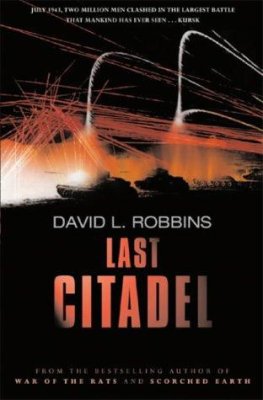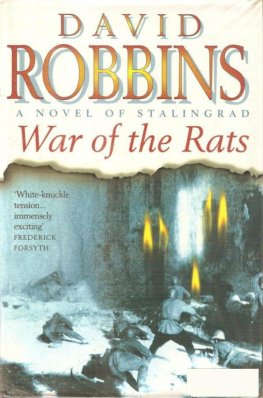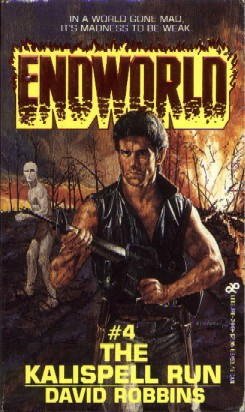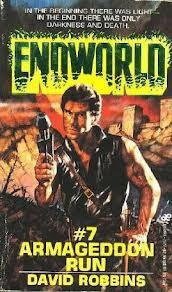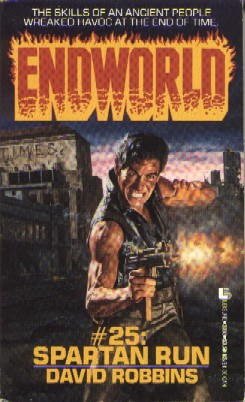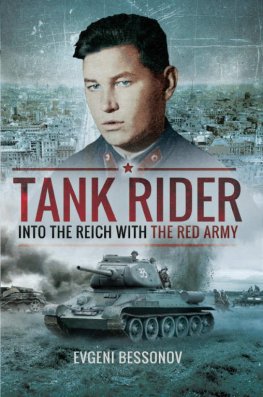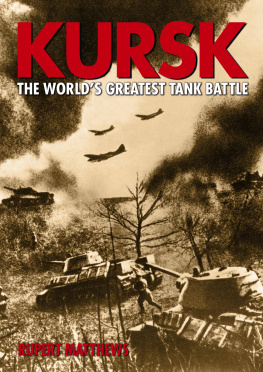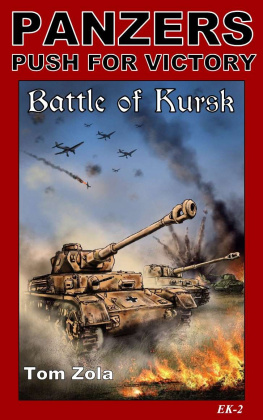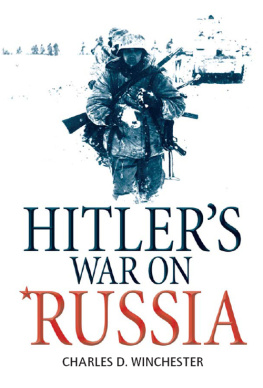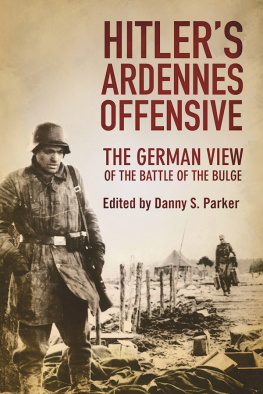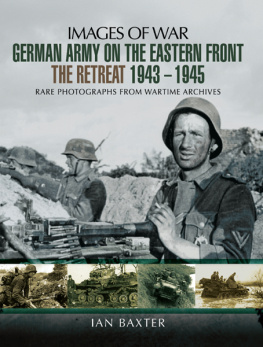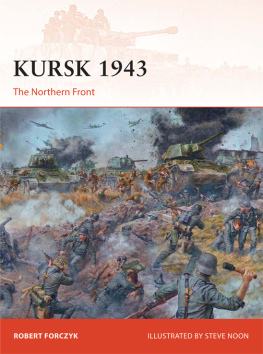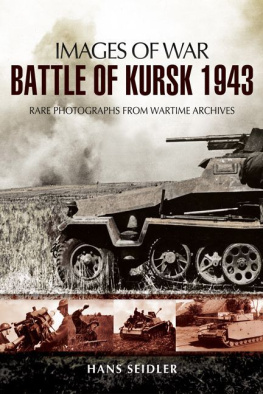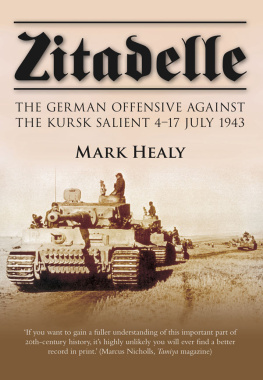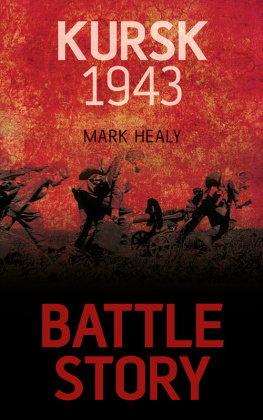David L. Robbins
LAST CITADEL
A Novel of the Battle of Kursk

I have decided to conduct Citadel, the first offensive of the year, as soon as the weather permits.
This attack is of the utmost importance. It must be carried out quickly and shatteringly. It must give us the initiative for the spring and summer of this year. Therefore all preparations are to be carried through with the greatest care and energy. The best formations, the best armies, the best leaders, great stocks of ammunition are to be placed at the decisive points. Every officer and every man must be impressed with the decisive significance of this offensive. The victory of Kursk must be a signal to the world.
Adolf HitlerOperations Order (No. 6) April 15, 1943
May 10, 1943
1440 hours
Reichs Chancellory
Berlin, Germany
The SS colonel eased shut the high, heavy door. The portal closed with a hiss and a soft tap. How many trees went into this, he wondered, lives sacrificed out of the forest to make one of Hitlers castle gates? The black eagle emblem of wartime hung at eye level against the carved wood. Colonel Abram Breit imagined this symbol of the Reich to be a spread-winged vulture. Thats what he left behind in the briefing room a death scene, a picking apart, sinew by vessel, of Germany.
Breit walked several steps into the hall, striding across the same black eagle laid in mosaic in the floor. Blood-red banners trickled down the walls. He buttressed his back against one of them and lit a cigarette.
He exhaled smoke and stared into it, tired and sad. He replayed the voices of the briefing room, Hitler with his generals and advisers. Citadel the looming, titanic battle for Kursk on the Eastern Front consumed the hours. Since morning Breit had watched the little wars between the generals, battling over Hitler as if the Fhrer were a spot of high ground; candor fell in combat with flattery, reason was mauled by pride. Around and above the grand table, more banners festooned the room, great ebony swastikas circled like the buzzards of Breits imagination. Everywhere Hitlers minions had hung the images of Hitlers belief, to let no eye wander to another way of thinking, to any other allegiance, certainly to no thoughts of Germanys welfare, only the Nazis.
Breit ground the last of the cigarette into the sole of his boot. He pocketed the white shred and lit another. In the smoke he recalled Hitlers eyes, wavering. In the past month, Hitler had become obsessed with reading about Verdun, the meat-grinder battle of World War I France. Hitler had been a corporal on the Western Front. As a runner he was wounded and gassed. Breit saw in Hitlers eyes the memory of the trenches, and the parallels to be drawn between the butchery of Verdun and what awaited Aryan manhood in the trenches of the Kursk bulge.
This was Germanys third summer of campaigning in Russia. The Reds had yet to swoon the way these generals had promised Hitler before the invasion in 41. Now the army lacked the resources for another major offensive in the East. Instead, their available forces were to concentrate on one smashing blow against the Kursk salient, a segment of the front line that ballooned westward into the German midsection.
The plan called for two immense forces to blast across the Russian defenses Field Marshal von Kluge from the north, Field Marshal von Manstein out of the south and converge in the center at the city of Kursk, pinching off the Soviet bulge. The operation was designed to surround massive Soviet formations and, more important, shorten German lines to free up men and machines desperately needed elsewhere. The Americans were sure to come to Italy this summer, and Il Duce, Mussolini, was ill-prepared to go it alone.
Hitler was going to commit every available soldier, gun, tank, and airplane to the action. This would be the largest buildup of German armed power of the war. If Citadel succeeded, it would be a loss of blood that Hitler could scarcely afford. If Citadel failed, the ruin of men and materiel would be even greater; worse still, Germany would be exposed to a Russian counterstrike. That could be fatal, the beginning of the end. Citadel would be the last German offensive of the war in the East.
The stakes for Hitler were higher today than at any time in the war. He was being asked to gamble, to throw the dice once on Citadel with everything riding on the table. There would be no second go-round, no backup plan. This was do or die.
The chief problem was that Citadel was obvious. A quick glance at the map of the Eastern Front lines presented the most elementary scenario to any war college student. The Kursk bulge was clearly the best place for an attack, a pincer action was the plain solution. Germany knew this. Russia knew this. The coming fight was going to be without surprise; once begun, it would be brute strength against strength, two behemoths pressing chests.
The Fhrer fretted aloud in the briefing room. He stabbed his finger at the maps spread across his conference table, aerial photos of Soviet defenses in the Kursk region. Even from three miles in the air, the groundworks dug by the Russians looked incredible; the amount of armaments and men flowing into them was monumental. And these defense works would be arrayed directly in the path of the planned German offensive. How could this be, Hitler wanted to know.
The buzzards flew from their perches then.
Field Marshal von Kluge spoke first, flapping to the table and sweeping a hand in the air over the foreboding maps. We will crush these pitiful defenses, the Field Marshal vowed, speaking in bald propagandistic phrases, the kind Hitler loved to hear. German ground forces have always penetrated enemy defenses and will do so in this case. Besides, look at the technological advantages we have, mein Fhrer. Look at our new tanks. Our Panthers and Tigers. Our tanks will make the difference, without fail.
Colonel Abram Breit had been brought to Berlin and was in the room to speak to this question of what impact the superior German armor would have on Citadel. Breit was the intelligence officer for the 1st SS Panzergrenadier Division Leibstandarte Adolf Hitler. His division was to be in the vanguard of the Citadel assault. Leibstandarte would enter the fight with thirteen of the new Tiger tanks. It was his job to predict how the battle would go. After von Kluge spoke, Hitler glanced at Breit.
Field Marshal von Manstein, the man whose proposals gave birth to Citadel, replaced von Kluge at the map table. Hitler smiled over at Breit. This was when Breit saw deeply into Hitlers eyes, when Hitler with a look apologized for skipping over Breit. They were the eyes, he realized, of an ill man. Hitlers physician had been treating him for constipation, prescribing ever more powerful laxatives. Hitlers eyes were lusterless, their striking blue was clouded. The Field Marshal began his comments. He said we may have waited too long. The Reds are getting ready for us. We should have attacked them in April, just after the spring thaw, the Russian rasputitsa. Breit watched Hitler agree, the dull eyes growing duller in disappointment and pain. Hitler did not know what to do. He slumped beside the great table where Germany lay and watched his visions of conquest and empire be pecked at by his commanders, who could not agree. His puffy face nodded; his chin sagged to his chest.
Field Marshal Keitel spoke next. We have to attack in Russia this summer, he said. For military as well as political purposes. Our allies demand that Germany not be passive in the East. The Italians need to see our resolve, as do the Finns and the Turks. Japan is concerned that we have not made sufficient progress against Russia. The German people require this, as well. The bombings and the failure at Stalingrad have taken their toll on morale. We must fight and win, Germany must retake the momentum. Our troops insist on a victory. Hitler listened and nodded, swayed again by whatever voice held the floor.

